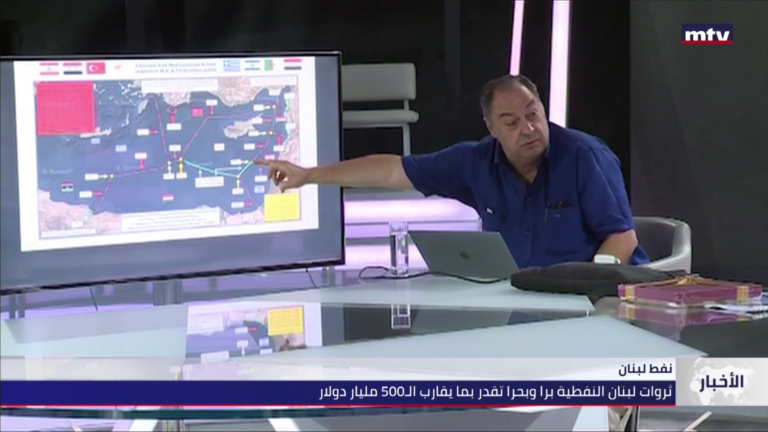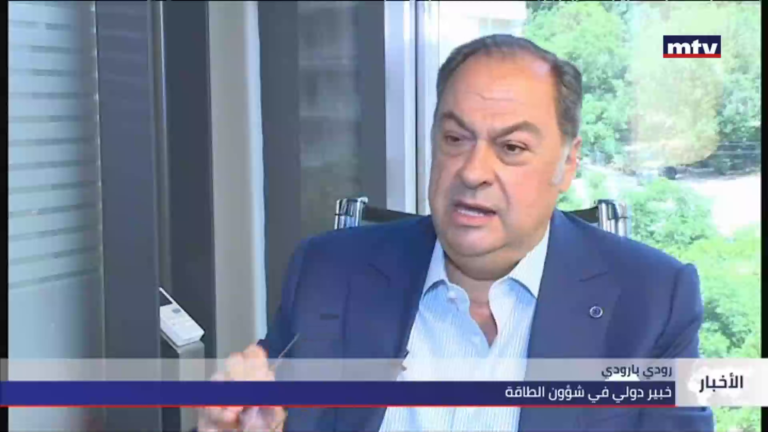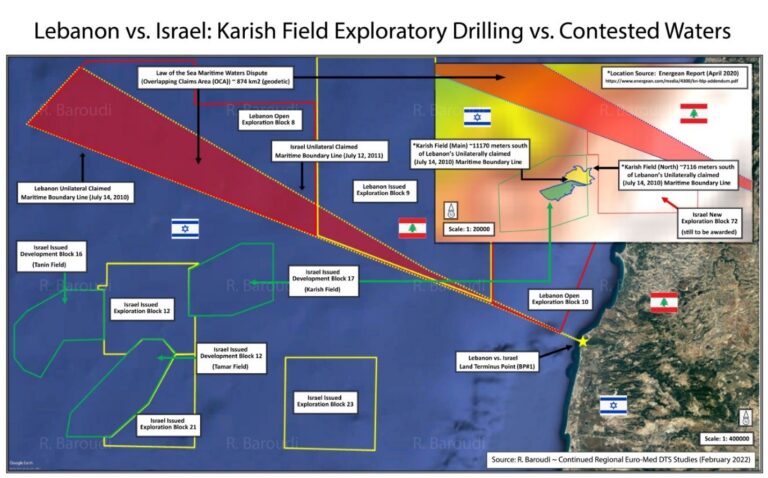رغبة قطرية في الدخول إلى التحالف للتنقيب عن النفط في البلوكين 4 و9

عقد رئيس الحكومة نجيب ميقاتي اجتماعا مع وزير الطاقة والمياه وليد فياض واعضاء هيئة ادارة قطاع البترول التي تضم وسام شباط،وسام الذهبي، غابي دعبول ووليد نصر .
وأعلن الوزير فياض بعد الاجتماع: عقدنا لقاء اليوم مع دولة الرئيس ميقاتي بمعية أعضاء هيئة إدارة البترول، بعد زيارة قمت بها لفخامة رئيس الجمهورية لتهنئته بالإنجاز التاريخي بشأن ترسيم الحدود وترسيخ حق لبنان بالمباشرة منذ الآن، بأعمال الاستكشاف في حقل قانا وسائر البلوكات في مياه البحر عندنا.
وكشف الوزير فياض عن رغبة قطرية في الدخول إلى التحالف للتنقيب عن النفط في البلوكين 4 و9. وقال:” لقد وردت الرغبة القطرية عبر رسالة من معالي وزير النفط القطري سعد الكعبي أعلن فيها نوايا دولة قطر الشقيقة بمشاركة لبنان بالدخول الى التحالف الذي سينقب في البلوكين 4 و9 لتصبح قطر الشريك الثالث لشركتي ” توتال” “وأيني” في هذين الحقلين، وهذا أمر مهم جدا، لأننا نعرف قدرة قطر الاستثمارية ورغبتها التي أعلنت عنها عبر زيارات مختلفة لسفيرها للوزارة للاستثمار في النهوض الاقتصادي للبنان في قطاع النفط والغاز ، في التنقيب وانتاج الطاقة.
وقال: لقد ارسلوا الى الوزارة المدراء العامين للشركة المملوكة من الدولة القطرية، وهي مهتمة بالاستثمار في قطاع الطاقة وانتاج الطاقة في شكل عام. ونحن نشكر دولة قطر على رغبتها في مشاركة لبنان باستثمار موارده والاستثمار في بناء الاقتصاد اللبناني. لقد عهدنا دائما وقوف قطر الى جانب الشعب اللبناني.
اضاف: أما الموضوع الثاني فهو ضرورة دعم هيئة إدارة البترول بالكادر البشري لمواكبة هذه المرحلة وادارتها وخصوصا العلاقة مع الشركاء، اي العلاقة التحالفية وإدارة العقد الذي يسمح بإدارة أعمال الاستخراج والاستكشاف التي ستبدأ قريبا ان شاء الله، ووضع الجدول الزمني المحدد للانجازات المتوقعة بالنسبة إلى الأمور اللوجستية وأمور الحفر والمنصة التي ستنشأ لإنتاج الغاز والنفط.ومن الضروري أن يكون لدى الهيئة الموارد اللازمة والكادر البشري المناسب لإدارة هذه المرحلة، وكان دولة الرئيس متجاوبا في هذا الشأن.
إجتماع تربوي
ورأس الرئيس ميقاتي اجتماعا شارك فيه وزير التربية والتعليم العالي القاضي عباس الحلبي، الوزير المفوض في سفارة العراق في لبنان أمين النصراوي، المستشارة الثقافية بان الموسوي، القنصل الأول مهند يحيى، مدير عام وزارة التربية في لبنان الدكتور عماد الاشقر، ومدير عام التعليم العالي الدكتور مازن الخطيب، ورئيسة دائرة المعادلات والامتحانات الرسمية أمل شعبان. وتم خلال الاجتماع بحث شؤون الطلبة العراقيين في لبنان.
الوزير الحلبي
بعد الاجتماع قال وزير التربية: عرضنا الموضوع المتعلق بالمعادلات الذي تقدم به الطلاب العراقيون الذين يتابعون دراستهم في بعض الجامعات في لبنان، والمشاكل التي انعكست سلبا على سير المعاملات، وتم الاتفاق على وضع آليات محددة تسهل على هؤلاء الطلاب من جهة مراعاة القوانين العراقية المطبقة، وكذلك القوانين اللبنانية المطبقة على موضوع المصادقات والمعادلات، واتفقنا على متابعة البحث في اجتماعات متتالية كل أسبوعين مرة بيننا وبين فريق السفارة لوضع حد لاي إشكالات قد تصيب أوضاع هؤلاء الطلاب في لبنان. نحن نعمل على تسهيل الموضوع مع مراعاة القوانين المطبقة، وعلى الجامعات المعنية التي سببت هذه المشكلة ان تساعدنا على ضبط الأعداد التي توافدت إليها من الطلاب العراقيين، لان هناك أخطاء ارتكبتها بعض هذه الجامعات كما ان هناك أخطاء ارتكبها بعض الطلاب، ولا نريد ان يتم دفع الثمن من قبل وزارة التربية التي تقوم بما عليها في تسهيل مهمة هؤلاء الطلاب. هذا الاتفاق سيسري في الأيام القليلة المقبلة ونأمل ان نتوصل الى حل هذه الإشكالات.
النصراوي
بدوره قال الوزير المفوض في سفارة العراق في لبنان أمين النصراوي بعد الاجتماع:” التقينا دولة رئيس الوزراء ميقاتي بحضور وزير التربية اللبناني والوفد الفني المرافق له، تحدثنا في كثير من الأمور التي تخص الطلبة العراقيين في لبنان، ونقلنا له تحيات دولة رئيس الوزراء مصطفى الكاظمي، وتوجيهاته بشأن ضرورة تسهيل أمور الطلبة الدارسين في لبنان. تطرقنا الى بعض المواضيع الفنية التي تواجه الأخوان الطلبة في بيروت، وتم الإتفاق على وضع ألية جديدة، وعلى تحديد اجتماعات دورية بين السفارة والملحقية الثقافية في بيروت ووزارة التربية لتذليل أي عقبة او مشكلة تواجه الطلبة العراقيين في لبنان.
أضاف: تداولنا مع الرئيس ميقاتي في بعض القضايا المتعلقة بالساحة اللبنانية واستمعنا الى رأيه في الكثير من المواضيع التي تدور حاليا، وكانت فرصة للإضاءة على العلاقة المميزة بين العراق ولبنان.
وإجتمع رئيس الحكومة مع وزير الدفاع الوطني موريس سليم، ثم مع وزير السياحة وليد نصار .












